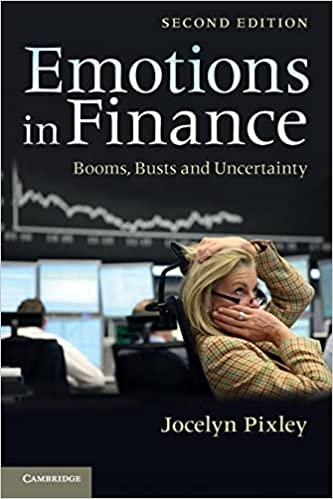Question
The value of any financial asset is the -Select-presentfutureterminalCorrect 1 of Item 1 value of the cash flows the asset is expected to produce. For
The value of any financial asset is the -Select-presentfutureterminalCorrect 1 of Item 1 value of the cash flows the asset is expected to produce. For a bond with fixed annual coupons, its value is equal to the present value of all its annual interest payments and its maturity value as shown in the equation below:
We could use the valuation equation shown above to solve for a bond's value; however, it is more efficient to use a financial calculator. Simply enter N as years to maturity, I/YR as the going annual interest rate, PMT as the annual coupon payment (calculated as the annual coupon interest rate times the face value of the bond), and FV as the stated maturity value. Once those inputs are entered in your financial calculator, you can solve for PV, the value of the bond. Remember that the signs for PMT and FV should be the same, so PV will have an opposite sign. Typically, you would enter PMT and FV as positive numbers, so PV would be shown as a negative value. The negative sign means that you are purchasing the bond, so the purchase price of the bond is paid out of your funds (thus the negative sign) and is received by the issuing firm (a positive flow to the firm). Note that we calculated the bond's value assuming coupon interest payments were paid annually; however, most bonds pay interest on a semiannual basis. Therefore, to calculate the value of a semiannual bond you must make the following changes: N should reflect the number of interest payment periods so multiply years to maturity times 2, I/YR should reflect the periodic going rate of interest so divide the going annual interest rate by 2, and PMT should reflect the periodic interest payment so divide the annual interest payment by 2. For fixed-rate bonds it's important to realize that the value of the bond has a(n) -Select-constantinverseparallelCorrect 2 of Item 1 relationship to the level of interest rates. If interest rates rise, then the value of the bond -Select-fallsrisesstabilizesCorrect 3 of Item 1; however, if interest rates fall, then the value of the bond -Select-fallsrisesstabilizesCorrect 4 of Item 1. A -Select-pardiscountpremiumCorrect 5 of Item 1 bond is one that sells below its par value. This situation occurs whenever the going rate of interest is above the coupon rate. Over time its value will -Select-increasedecreaseflattenCorrect 6 of Item 1 approaching its maturity value at maturity. A -Select-pardiscountpremiumCorrect 7 of Item 1 bond is one that sells above its par value. This situation occurs whenever the going rate of interest is below the coupon rate. Over time its value will -Select-increasedecreaseflattenCorrect 8 of Item 1 approaching its maturity value at maturity. A par value bond is one that sells at par; the bond's coupon rate is equal to the going rate of interest. Normally, the coupon rate is set at the going market rate the day a bond is issued so it sells at par initially.
Quantitative Problem: Potter Industries has a bond issue outstanding with an annual coupon of 6% and a 10-year maturity. The par value of the bond is $1,000. If the going annual interest rate is 8%, what is the value of the bond? Do not round intermediate calculations. Round your answer to the nearest cent.
$
Quantitative Problem: Potter Industries has a bond issue outstanding with a 6% coupon rate with semiannual payments of $30, and a 10-year maturity. The par value of the bond is $1,000. If the going annual interest rate is 8%, what is the value of the bond? Do not round intermediate calculations. Round your answer to the nearest cent.
$
Step by Step Solution
There are 3 Steps involved in it
Step: 1

Get Instant Access to Expert-Tailored Solutions
See step-by-step solutions with expert insights and AI powered tools for academic success
Step: 2

Step: 3

Ace Your Homework with AI
Get the answers you need in no time with our AI-driven, step-by-step assistance
Get Started


